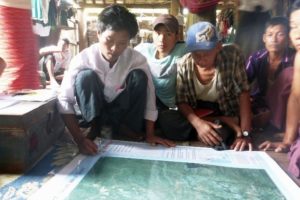
Across Burma there is limited access to information on local populations’ legal and customary rights to own, use, and manage land and natural resources. This lack of information presents a challenge to civil society organizations (CSOs) and village communities that need a clear picture of the land and resource tenure situation to contribute to sustainable land use planning.
Working in close coordination with the Land Core Group (LCG), Burma’s leading CSO focusing on land issues, USAID is supporting capacity-building activities for civil society organizations to implement land tenure assessments. Importantly, the assessment methodology seeks to increase interaction between local government officials and community members, thereby reducing distrust between these parties.
Based upon participatory rural appraisal techniques, the training allows CSOs to identify key land resource issues faced by a communities. These standardized outputs can then be used to guide future efforts for tenure recognition and dispute resolution.
Representing the Public Network CSO of Thayarwaddy District, North of Yangon, U Win Htut believes that the delivery of such training clearly supports rural development objectives. “Training youth-based CSOs, like ours, means that information on this subject can be given to residents to create opportunities to improve community welfare.”
The answers to the assessment questions, allow CSOs to generate findings that can be compared between different locations, are used to formulate broader community education efforts associated with land rights and ultimately support regional or national land administration efforts to protect rural community and customary tenure arrangements.

